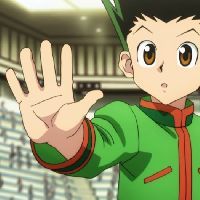The following interview took place on the last day of September during Anime Weekend Atlanta. It has been transcribed from a cell phone recording and edited for clarity and length.
You have a strong stage pedigree (The Crucible, Fiddler on the Roof)...
VM: Oh my gosh, I can't believe you said The Crucible! I love that show.
Can I ask what you did in The Crucible?
VM: Well, The Crucible is one of those shows where I've done it more than once, so I got to play multiple characters, which was fun. The first time I did it I actually played John Proctor, the main character, and it was such a profound experience. And then a couple of years later I was in it again, in another performance at another theater, and I played Reverend Parris. Which was really fun because when you're in a show and you're playing a certain character, you can't help but watch the other characters and imagine what you might do with that character if you were playing them. Chances are you never will, right? So when I ended up getting cast as Reverend Parris I thought "Oh my gosh, now I can play Parris the way I imagined playing him when I played Proctor!"
How has your theater experience shaped your voice acting career?
VM: The operative word in voice acting is acting. I think it's because I so deeply loved acting and got involved in acting—whether it's the stage or on camera, whatever—because of my love for acting, that's what caused me to develop the skills and then be prepared to voice act. Most of the voice actors I know have huge backgrounds in theater or on-camera work, or acting degrees in college. I would say that acting since I was very young prepared me for the most part, if not in totality, for being a voice actor.
As opposed to stage acting, how much of the story do you generally know for a VA role?
VM: You generally don't know squat! I mean, usually, you don't know much. You go in and most times it happens so quick—like, literally, I could get a call tomorrow that says "Hey, can you come in Monday for such-and-such?" and I've never heard of such-and-such. I don't have time to read it or watch it, so I go in Monday morning and they say "Okay, you're playing So-And-So and he's a such-and-such who does such-and-such. Go." You're putting it together very quickly and it happens very fast. So there is not a lot of time to prepare, and unlike a stage play where you rehearse and memorize the lines with other people, voice acting is very quick and there is not a lot of preparation time at all. Very little preparation time, did I stress that? Very little preparation time!
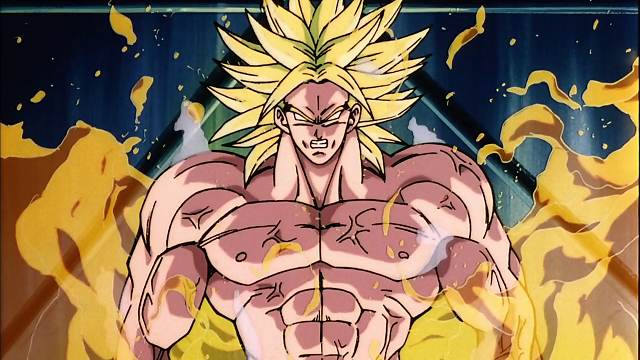 Broly, from Dragon Ball Z Movie 08: Moetsukiro!! Nessen, Ressen, Chougekisen
Broly, from Dragon Ball Z Movie 08: Moetsukiro!! Nessen, Ressen, Chougekisen
So how do you work around that?
VM: You don't! You just learn to roll with it. You know going in what's required of you in the time that's required of you. For instance, you just walked in this room, didn't you? And I met you. Have we discussed this interview? Do I have any idea what you're about to say? Exactly. See my point? So when I walked in this room I had no idea what was going to happen. So there wasn't any preparation where you'd sent me a list of questions and I knew what I was going to say. You've just got to go with it. Voice acting—anime voice acting, specifically—is very much like that. You don't get the scripts in advance. Now, if you know you're in a show, sure, you can go online and watch the show or read the manga, if you have that kind of time on your hands. But usually you don't, so often you'll walk into a room and the director will give you and overview of what's happening, where you are, and then you go.
It sounds more organic that way. You can bring a little more of yourself to the work as opposed to being influenced by another portrayal.
VM: There's definitely something to be said for that, that there's a spontaneity about it. There isn't any time to overthink it, you know, no "I've been contemplating how I was going to do this line for six weeks!" No, you don't have that kind of time. It's just like "There's the line for the first time, you've just read it. Go." And as you do it the first time you may think "Oh, this might be cool!" And you say to the director "Can I try it this way?" They go "Sure." Try it that way, they're like "I liked it the other way better, let's move on."
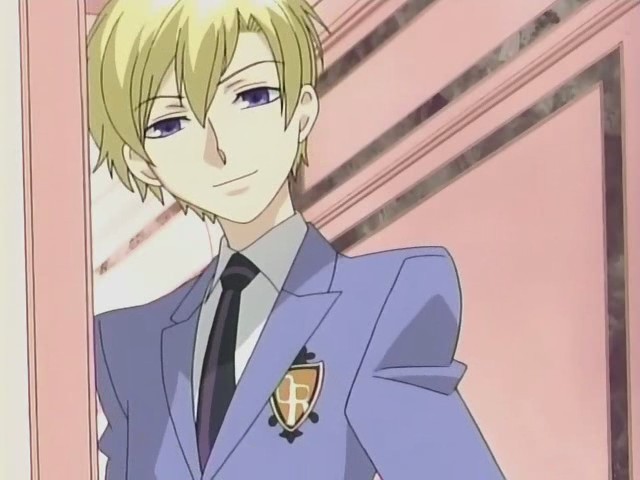 Tamaki Suou, from Ouran Koukou Host Club
Tamaki Suou, from Ouran Koukou Host Club
You're openly a person of faith in the animation industry. How does this aspect of your life influence your approach to your work?
VM: Well, first of all let me say that anybody of faith should be open. What's the point of faith if you're not open about it? If you don't share it, what good is it, you know what I mean? So I try to be open about it, and I think anybody who has any kind of faith should. Having said that, my faith is a foundation of my life, so anything else that I do, my faith is going to have to factor into it, because it starts there. I get a lot of interesting questions, as you can imagine. But rather than hiding myself in a room someplace, just me and my faith, I feel like God wants me to be out in the world, among people, in an industry, trying to make a difference wherever I am, trying to bring some kind of light or faith or message of hope wherever I am, whether it's the anime industry, a recording studio, a soccer field, an airplane, a convention, an interview...I think it's my calling, if you will; it's expected of me to bring my faith to whatever I do and whatever I am.
And if you do something you love, you never work a day in your life.
VM: That's for sure, and certainly I haven't worked for years!
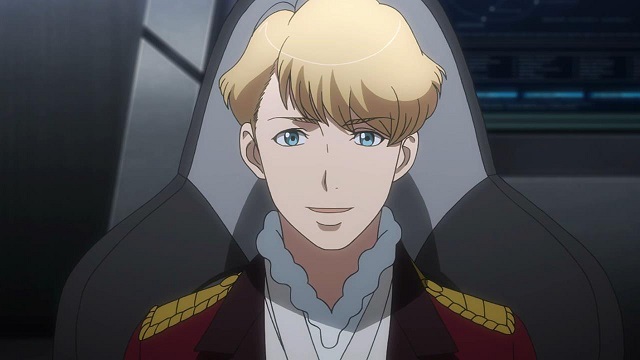 Klancain, from Aldnoah.Zero 2nd Season
Klancain, from Aldnoah.Zero 2nd Season
You've been involved in fan works like Fullmetal Fantasy and Star Trek Continues. What is the biggest difference between "professional" fan works and official industry productions?
VM: There's always something thrilling about being a part of something official. For instance, I just got done playing a role in Star Trek Online. Well, that's official, licensed Star Trek. As a fan, there's something very thrilling about that. Having said that, the beautiful thing about a fan production is that you can make it whatever you want it to be. If I want to make a Star Trek episode and it's just for love of Star Trek, just to celebrate my lifelong for that show, then I can make that episode anything I want it to be. I'm not beholden to the licensor or the owner or the guy who's putting up the money or whatever. It's literally my passion.
If I hire you to write a story, you dang well better write the story I want you to write and it better please my expectations, right? But if you just sit down on your own with a blank sheet of paper, you write whatever you want. There's something very special and very pure about that, and I think that's very much demonstrated by my fan series, Star Trek Continues. We do it purely for love of the series, to celebrate and pay tribute to the original, and it's not meant to make money. It's not meant to make us popular. It's not meant to be a blockbuster! It's just meant to celebrate Star Trek, and to be what we want it to be.
Todd Haberkorn, your Spock, is here this weekend as well!
VM: Yes, yes, he is a wonderful Spock! It's funny—when he first wanted to audition, I wanted to cast good actors. You know, fan films are notorious for having bad actors. They're fans, they're not actors. When I started this, I wanted to have good actors in this thing, so I could tell good stories and move people. I thought "Todd might be a good Spock..." and then part of me said "Yeah, but he's pretty young. Spock's a little more mature than that." But Todd said "Can I audition?" and I said "Sure." So he recorded an audition, and he's a great actor, so I decided to go ahead and cast him. Also because I wanted to make this with people that I liked, and friends of mine. I didn't want to just hire strangers; I wanted to make it with people that I had already forged friendships with. Like him, or Grant Imahara, or Chuck Huber. You know, people that I knew and loved already. That's one of the things I think makes our production very special.
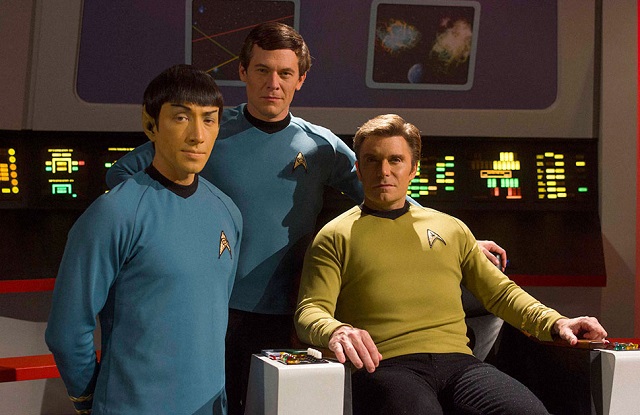 Vic Mignogna, Chuck Huber, and Todd Haberkorn as Kirk, Spock, and McCoy in Star Trek Continues
Vic Mignogna, Chuck Huber, and Todd Haberkorn as Kirk, Spock, and McCoy in Star Trek Continues
Other than Broly from Dragon Ball Z, what do you consider your most difficult role?
VM: Well, Broly was only difficult from a vocal standpoint. You didn't have any deep emotion, you didn't have to "work hard to capture the essence of..."—no, he doesn't have any essence, he just beats the crap out of everybody. But he was vocally challenging. You know, I was just telling somebody earlier, there was another character that I played that was equally if not more vocally challenging, and that was Mad Leomon from the Digimon Fusion series. He's this giant lion/robot creature, and...I mean, he was worse than Broly! The only good news was that they killed him off pretty quick, and Broly won't die. That's the difference.
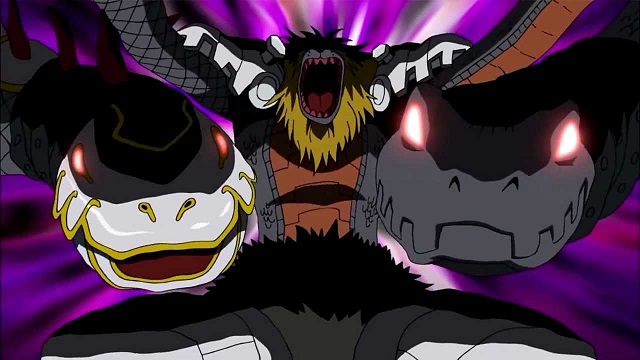 MadLeomon in Orochi Mode from Digimon Xros Wars
MadLeomon in Orochi Mode from Digimon Xros Wars
Because nobody dies in DBZ!
VM: That's right! They just get stronger...
How has voice acting changed since you began? How is it easier, how is it harder?
VM: There's certainly a lot more competition now. When I started voice acting, it was this little niche—this weird little subculture, you know? Companies like ADV and Funimation just loved anime, so they were buying these titles and dubbing them into English. I don't think anyone ever expected that it would grow into what it has become. In fact, I'm sure of it. I'm sure that no one ever imagined that it would have exploded the way anime has over the years, and I'm just blessed enough, fortunate enough, to have been on the ground level when it blew up.
I've often thought that if I were new to the industry now, I don't even know if I would ever be cast. You wonder sometimes, because there are a lot of really great people out there, desperate to get involved in it.
How do you distinguish yourself now that the field is so much bigger?
VM: You know, there are a lot of voice actors that have been around for a very long time. They have not had the opportunities that I've had. They've not ended up getting cast in some of the roles that would become fan favorites. So you could spend thirty years as a voice actor and never get to play a role like Edward Elric. It's not a bad or a good thing, it's just the way it happens. Either it does or it doesn't. You could play tons of great characters in great shows...
In fact, you know what? I'm not going to say his name, because I don't want to sound dismissive. But there is a guy who was the guy who introduced me to ADV. He was a guy who was already voice acting at ADV in Houston, eighteen years ago, when he said to me "You ought to go and audition for this place, because they're looking for actors!" Now, this guy has done as much work, probably, as I have, if not more...and yet very few people know who he is. And he's as talented a voice actor as, if not more than, I am.
But that's not the point. The point is that at some point in time I auditioned for something that I got cast as, and I did my best with it and people really enjoyed it, so it took hold. It has very little to do, I think, honestly, with talent or being "deserving" of it. It's just a lucky break. So I know that there are a lot of very, very talented voice actors out there who are relatively unknown at this point, and they're probably awesome, and the little opportunities they get they do a great job with. Which is key. Whatever opportunity you get, give it your absolute best. But just because they're not super well known or just because they don't get invited to anime conventions or sign autographs doesn't mean they're not good. It just means that they haven't had that opportunity.
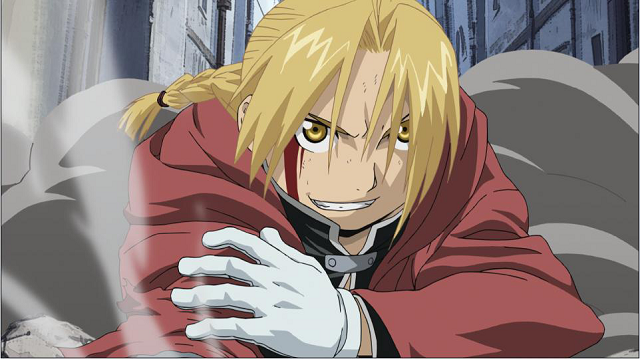 Edward Elric, from Fullmetal Alchemist: Brotherhood
Edward Elric, from Fullmetal Alchemist: Brotherhood
It's very much being in the right place at the right time.
VM: Very much so. Very much so. But also you have to be prepared. You could be in the right place at the right time But if you're not ready, what difference does the fact that you were in the right place at the right time make? You know what I mean?
You know, a lot of people have asked what it takes to get into voice acting. I've often said it's who you know, or being in the right place at the right time, and that certainly has a lot to do with it. But I would also say—and this is kind of my catchphrase that I worked up years ago, I really feel like it encapsulates the idea—who you know might get you through the door, but what you know will keep you in the room. You may get an opportunity because of a lucky break, or your uncle knows a guy who knows a guy, or you have a friend who runs a studio. You may get in the door! But if you're not ready, if you're not prepared, if you're not sharp and ready to make the most of that opportunity, that lucky break may come and go. You may never see another one.



